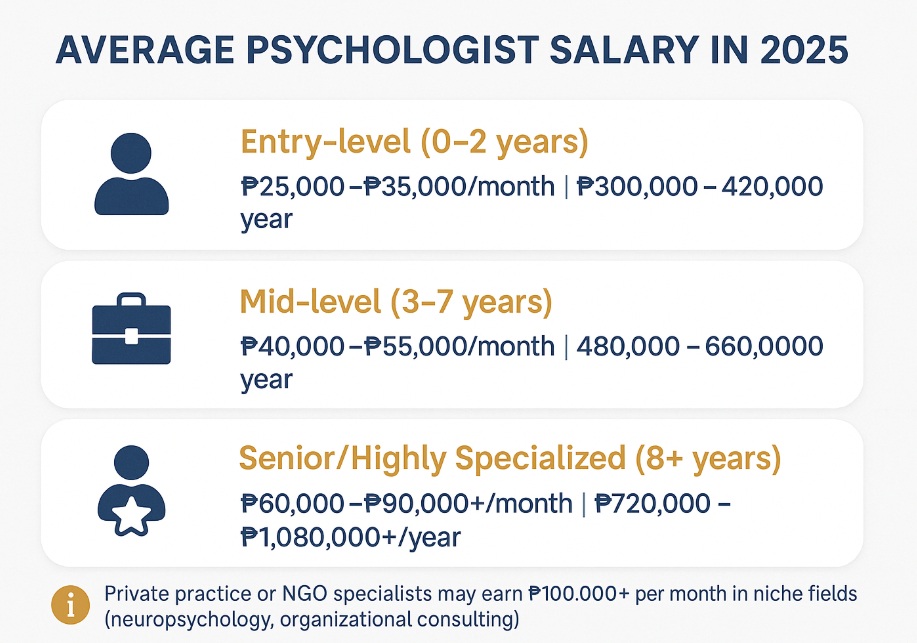Psychologist Salary In The Philippines

Pursuing a career as a psychologist goes beyond a passion for understanding human behavior, it also requires considering practical aspects such as income and professional growth. If you are looking into psychology as a profession, understanding the psychologist salary in the Philippines, the factors that affect it, and the opportunities for career advancement can help you make informed decisions.
Average Psychologist Salary
Based on data from the Department of Labor and Employment (DOLE) and recent job postings, here’s what you can expect as of 2025:
| Level of Experience | Typical Monthly Salary | Annual Salary Range |
|---|---|---|
| Entry-level (0–2 years) | ₱25,000–₱35,000 | ₱300,000–₱420,000 |
| Mid-level (3–7 years) | ₱40,000–₱55,000 | ₱480,000–₱660,000 |
| Senior/Highly specialized (8+ years) | ₱60,000–₱90,000+ | ₱720,000–₱1,080,000+ |
Some private practice psychologists and those working in international NGOs can earn ₱100,000+ per month, especially if they have niche expertise such as neuropsychology or organizational consulting.
Regional Salary Variations (2025)
| Region | Average Monthly Salary (₱) | Notes |
|---|---|---|
| NCR | 45,000–70,000 | Highest due to cost of living |
| CALABARZON | 40,000–60,000 | Industrial hubs, many schools |
| Central Visayas | 38,000–55,000 | Cebu and surrounding areas |
| Davao Region | 37,000–50,000 | Growing demand in public health |
| Other provinces | 30,000–45,000 | Lower cost of living, fewer opportunities |
Salary Progression for Government Psychologists
Under the 2025 second tranche of the Salary Standardization Law VI (SSL VI), Salary Grade 16 covers a range of service-based pay steps:
| Step Level | Monthly Salary (₱) |
|---|---|
| Step 1 | 43,560 |
| Step 2 | 43,996 |
| Step 3 | 44,438 |
| Step 4 | 44,885 |
| Step 5 | 45,338 |
| Step 6 | 45,796 |
| Step 7 | 46,261 |
| Step 8 | 46,730 |
Allowances & Benefits
Aside from base pay, government psychologists receive:
-
PERA (Personnel Economic Relief Allowance) – ₱2,000/month
-
Clothing/Uniform Allowance – ₱6,000/year
-
Mid-Year Bonus – 1 month’s basic salary, given in May
-
Year-End Bonus & Cash Gift – 1 month’s basic salary + ₱5,000, given in November
-
Step Increments – Salary increases for every 3 years of satisfactory performance
-
Hazard Pay – For those in psychiatric hospitals or high-risk units (ranges ₱1,000–₱3,000/month)
-
Retirement benefits – GSIS, PAG-IBIG, and PhilHealth coverage
Factors That Affect Your Salary
1. Work Setting
-
Hospitals and Clinics – Government hospitals typically follow the Salary Standardization Law (SSL), where a licensed psychologist might start at Salary Grade 16 (₱39,672/month as of 2025). Check details about mechanical engineering salary
-
Schools – Educational institutions may offer slightly lower rates for full-time positions, but benefits like tenure and reduced work hours can offset this.
-
Private Practice – Earnings depend on your client base and consultation rates (usually ₱1,000–₱2,500 per session).
2. Education and Licensure
A master’s degree is usually required to become a licensed psychologist in the Philippines, as mandated by the Philippine Psychology Act of 2009 (RA 10029). Those with doctoral degrees often secure higher-paying roles in academia or specialized practice.
3. Specialization
Fields like clinical neuropsychology, forensic psychology, and industrial-organizational psychology often command higher fees due to specialized skills.
4. Location
Metro Manila offers the highest salaries due to cost of living and concentration of institutions, while provincial rates may be 15–30% lower.
Frequently Asked Questions
How much do psychology interns earn in the Philippines?
Internships are typically unpaid or offer small allowances ranging from ₱3,000–₱8,000 per month, depending on the institution.
Is psychology a high-paying job in the Philippines?
Compared to other professions, psychology offers moderate salaries. However, private practice and specialized fields can be highly lucrative.
Do psychologists in government earn less than in private companies?
Entry-level pay in government may be slightly lower, but government jobs offer strong job security, standardized salary increases, and generous benefits.
Can I work abroad as a Filipino psychologist?
Yes, but you may need to meet the licensing requirements of your destination country. Salaries abroad, such as in the U.S. or Middle East, can be significantly higher.
What is the consultation fee for psychologists in the Philippines?
Private session rates usually range from ₱1,000 to ₱2,500 for 50–60 minutes, depending on specialization and location.
A career in psychology in the Philippines can offer both personal fulfillment and financial stability. While entry-level salaries may be modest compared to other fields, your earning potential increases with experience, professional credentials, and a solid network. Understanding the psychologist salary in the Philippines and the growing demand for mental health services highlights why now is an ideal time to pursue this rewarding career.






